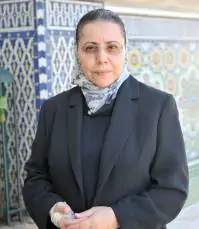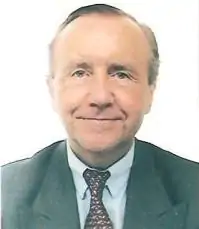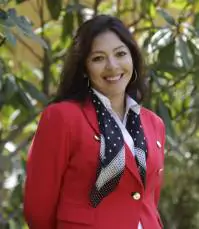
- email@yourmail.com
- + 0123 3456 7890
- www.yoursite.com
My name is Saadia BELMIR, of Moroccan nationality, I am a career magistrate, with the rank of President of Chamber at the Court of Cassation.
Besides my main professional activities, I am a member of the Torture Committee in Geneva, and of the Superior Council of Ulemas of Morocco (jurisconsults).
Professionally, I have held several positions, including Magistrate at the Court of First Instance of Rabat, Deputy Public Prosecutor at the Court of Appeal of Rabat, then Counselor at the Court of Appeal of Rabat, attached to the Central Administration of the Ministry of Justice (General Secretariat, part of the national and international legislation group). Counselor at the Court of Cassation, member of the administrative chamber). Member of the Constitutional Council.
Concerning my studies, diplomas and internships, after the license in political sciences and my first year of DES in political sciences (Morocco), I obtained the DES, then the Doctorate of State in public law in France, (Paris II). I taught for several years at the Magistrates’ Training Institute of Morocco. At the same time, I was a member of the previous Advisory Council on Human Rights and then the Human Rights Council.
– On another level, I was part of the national steering committee of the action plan for democracy and human rights Rabat.
– Previously, in 1996 I had the honor of being part of the think tank of His Majesty King Hassan II (April 1996 – July 1999).
– And, I represented the Ministry of Justice in several international meetings and congresses and participated in the elaboration of bilateral conventions notably in DIP.
– I have followed judicial courses, particularly in France, and others in the field of human rights:
- at the United Nations Office in Geneva.
- at the International Institute for Human Rights, Strasbourg. (In 1991 I graduated from the institute and attended the 1997, 2002, and 2005 sessions).
- at the Institute of Humanitarian Law, San Remo (Italy summer 1990).
- at the Prince Edward Institute in Charlote Town (Prince Edward Island, Canada).
- at the Canadian Human Rights Foundation (summer 1992).
Given the reputation of the IIDH, Morocco has taken the initiative to send groups of jurists (judges, lawyers, judicial commissioners, members of NGOs) each year for the July sessions, to receive training in human rights.
The importance of the teaching, its level, its methods, practical and theoretical, the judicious choice of the topics, the quality of the teachers and the participants coming from several countries, made that each one who takes part in a session, makes his possible to take part in the later sessions.
Thus, my designation to take part in a first session, of the IIDH to which I was designated, became acquired for other following sessions.
This is how my story with the IIDH sessions began. Every year, I dreamed of my projected stay in Strasbourg. This allowed me to participate in several sessions, to have contacts with teachers and participants and the exchanges were important and instructive.
The 1991 session was interesting and somewhat difficult, as it was the session in which I prepared and graduated from the IIHR.
The main theme of this session was human rights and the family, development and implementation of international standards.
– Among the teachers of the session, there was Mr. M. Nowak whom I would meet again a few years later at the Palais Wilson when I joined the Committee against Torture.
– As a teacher at the Judicial Training Institute, my IIDH Diploma allowed me to join the group of teachers in public law. The inauguration of the human rights unit put me in charge of the human rights course at the Institute.
– My participation in the 1997 and 2002 IIDH sessions on Prevention as a Means of Ensuring Respect for Human Rights and International Protection of the Right to Life, respectively, inspired my course on international and regional prevention of human rights violations.
– This course was an opportunity for me to transmit my knowledge of Strasbourg to future judges, and then during national seminars to other categories of lawyers.
– In all, I can say that simply the IIDH was for me the regulator that helped me to have a clearer vision of my judicial mission, so constraining, so difficult, taking into account that the establishment of the Rule of Law and the human rights, In this way, the fact that I attended several IIDH sessions on an almost regular basis, helped me to correct my working method and to see my profession and the other missions I perform in a different way, with reference to my knowledge of human rights acquired at IIDH.
I am grateful and proud of it.

- email@yourmail.com
- + 0123 3456 7890
- www.yoursite.com
Throughout my career as a judge and member of international committees, I have seen the importance of the role of the IIDH at the national and international level, whether it be in teaching, training, disseminating or promoting human rights:
-I noticed it first in my judicial functions, in particular at the Court of Appeal of Paris and at the Court of Cassation, during which I often relied on the IIDH documentation for the preparation of the trainings and conferences on the European Convention on Human Rights that I was in charge of giving to magistrates and students;
-I have also noted this during the many years during which I regularly participated in meetings at the Council of Europe, on the one hand as a member of the Steering Committee on Crime Problems (CDPC) and the Steering Committee on Human Rights (CDDH), and on the other hand as a magistrate seconded to the position of Deputy Director of Legal Affairs at the Ministry of Foreign Affairs, which led me to present the defense of France in a number of cases before the Commission and the European Court of Human Rights . These years gave me the opportunity to have valuable contacts with the IIHR, in particular with Professors Jean-François Flauss and Gérard Cohen-Jonathan.
-I also saw the importance of the role of the IIDH at the international level during my mandates as an expert on the United Nations Committee on the Elimination of Racial Discrimination, then on the Council of Europe’s Commission against Racism and Intolerance, as well as on the French Commission on Human Rights, also founded by René Cassin. During these mandates, I was able to measure the influence of the IIHR well beyond France.
-Finally, this outreach of the IIDH, I had further proof by participating in conferences or teachings organized by the IIDH and attended by students from various countries: such was the case in recent years, for example, at the University Panthéon-Assas in Paris in 2013 and at the IIDH Human Rights Clinic in 2014.
In light of all these observations on the eminent role of the IIDH, I decided to give my full support in 2014 to the creation of the new Foundation “IIDH-Fondation René Cassin”, convinced that this Foundation of public utility will make it possible to pursue and amplify the fundamental mission of the Institute, assumed from its founder René Cassin to our dear President Jean-Paul Costa.

- email@yourmail.com
- + 0123 3456 7890
- www.yoursite.com
The first approach I had with the René Cassin International Institute for Human Rights (now the Foundation) was when I heard about the annual summer sessions. I was a student at the Faculty of Law of the Pontifical Catholic University of Peru at the time, and participating in this kind of initiative was one of the dreams I couldn’t realize. A few years later, as a professor and director of the Institute of Democracy and Human Rights at my university, I received an invitation to participate in the annual session as a teacher, which was a sign of great joy but also of great responsibility.
In the four consecutive years that I have been teaching, I have had the opportunity to learn more about the work of the Foundation, its outreach and promotion of research, and most importantly, its ability to significantly influence the vocation of many young people around the world. During these sessions, I met people of all ages, from different backgrounds, with different professional backgrounds, with their own stories, but all of them shared the enthusiasm and ideal of promoting human rights around the world.
I think that convening, year after year, such human diversity is the great bastion of the IIDH and what converges the experiences of the teachers, the kindness of the executive and administrative staff and the beauty of the surroundings of Strasbourg with the impetus and energy of the students, who certainly learn about human rights, but above all, that coexistence, respect and tolerance are the true cornerstone of this normative and moral set.